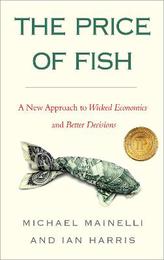
|
The Price of Fish: A New Approach to Wicked Economics and Better Decisions
Paperback / softback
Main Details
| Title |
The Price of Fish: A New Approach to Wicked Economics and Better Decisions
|
| Authors and Contributors |
By (author) Ian Harris
|
|
By (author) Michael Mainelli
|
| Physical Properties |
| Format:Paperback / softback | | Pages:336 | | Dimensions(mm): Height 214,Width 134 |
|
| Category/Genre | Economics |
|---|
| ISBN/Barcode |
9781857886221
|
| Classifications | Dewey:330 |
|---|
| Audience | | Tertiary Education (US: College) | | Professional & Vocational | |
|---|
|
Publishing Details |
| Publisher |
John Murray Press
|
| Imprint |
Nicholas Brealey Publishing
|
| Publication Date |
11 September 2014 |
| Publication Country |
United Kingdom
|
Description
In The Price of Fish, Michael Mainelli and Ian Harris examine in a unique way the world's most abiding and wicked problems sustainability, global warming, over-fishing, overpopulation, the pensions crisis; all of which are characterized by a set of messy, circular, aggressive and peculiarly long-term problems and go on to suggest that it is not the circumstances that are too complex, but our way of reading them that is too simple. Too simple and often wrong. The authors aim to blend four streams choice, economics, systems and evolution in a combination they believe is the key to making better decisions and, in turn, finding answers to the world's most pernicious problems.
Author Biography
Educated at Harvard, Michael Mainelli is Commerce Professor Emeritus and Fellow at Gresham College (founding home of the Royal Society and former home to Christopher Wren). He is also Visiting Professor at LSE and was responsible for creating the London Accord the world's leading research cooperative into environmental, social and governance investment. He is the co-founder of Z/Yen, the City of London's leading commercial think-tank established in 1994 to promote societal advance through better finance and technology. Over the course of his career, he has worked in economics, political science, seismology, cartography, energy information, research and development, in defense and at the highest level of accountancy. Ian Harris is a co-founder of Z/Yen, having previously conceived and launched the award-winning joint venture Charity Share and guided the Marine Stewardship Council towards a Best Practice award for its strategic planning and governance, as well as working to solve other problems of long-term thinking in charities and other non-governmental organizations.
ReviewsAs one of the world s largest fish buyers I lived on a daily basis with this Wicked Problem . Michael s and Ian s contribution is a welcome insight to complex commercial decision making. - Mike Parker, former Deputy CEO, Findus Group, Europe s largest seafood processor Mainelli and Harris are very bright fellows. It shows in this elegant and witty approach to resource economics which tackles all those dangerous issues which arise when Mother Earth and the market collide. - Richard D North, media fellow, Institute of Economic Affairs I defy anyone not to enjoy this presentation of global issues explained in an innovative way with amusing anecdotes and analogies. - Sir David Lewis, former Lord Mayor of London, former Chairman and Senior Partner, Norton Rose Your mother used to tell you that fish is good for the brain. Reading this terrifying analysis will prove her right. - Stephen McDowell, Editor-in-chief, Interactive Investor Group Crazy but worth your attention. - Sir Willie Purves, former Chairman, HSBC This book shows how unpicking something as innocent as the price of fish reveals an interconnected world of wicked problems , unravelling which will be vital to squaring the demands of a rising population with climate change and resource depletion. - Gerard Wynn, Environmental Markets Correspondent, Reuters News In this thought-provoking and enlightening book, Mainelli and Harris highlight a point that economists too often forget: that economics is, at its heart, the study of human behaviour, and that both commerce and its wicked sister, finance, mean nothing unless they are connected to people and society. We have all discovered, painfully, that there are some areas, important to our existence, where price signals have worked badly or not at all. Financial markets are one. Deep-sea fishing part of the tragedy of the commons - is another. This book is a challenging contribution to understanding these failures.
|